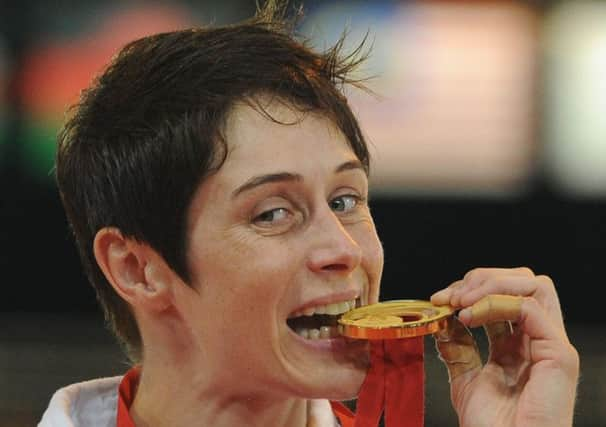One more fight and Clark secures a golden farewell


Just one more time, she urged her broken body. “Bits of me were hanging off and falling off,” Clark revealed after her triumph at under-63kg. “I had double ankle surgery at the same time. For two and a half weeks I couldn’t even walk. Then I needed surgery to my shoulder and fingers. But then I started to get better. I decided that, if I was to compete in Glasgow, I had to be as fit as possible and today I don’t think I couldn’t have felt better.”
The crowd in Hall 3 of the SECC couldn’t have felt better either as they cheered the 36-year-old Clark’s win over Cameroon’s Helene Wezeu Dombeu to the rafters. Well, probably they’d have liked fellow Scots Sally Conway to have improved on her bronze and Patrick Dawson to have got among the medals, but still, judo has made a sensational contribution already.
Advertisement
Hide AdAdvertisement
Hide AdAn adopted Scot from South Shields, Clark came to Edinburgh 18 years ago to train for the world juniors and liked it so much she stayed. A triple Olympian, she’s been European champion and 11 times the British champion.
But after improving on the silver she won at the 2002 Commonwealths, that’s it, she’s quitting. “Even if I wanted to compete for two more years my body wouldn’t hold out,” she said.
Clark watched Dombeu through the day’s early rounds and thought: “She’s really strong.” There were four hours to kill between semi-final and final – a long time. “I cooled down. I had a long slow cycle. I put on my headphones and tried to sleep but couldn’t because of the lights and the noise. Things go through your head, as demons do: the win, the lose, the what if? I’ve worked with psychologists and, even though you go over the same things a thousands times, the doubts are always there. What if I don’t win?”
But she did win; the perfect ending. “I knew that, if I didn’t win after nine months building up to this day, I’d be really sad but I also knew that, if I was the best I could be, I was going to do it. And today I couldn’t have been any better – certainly not at my age!”
After a day at the triathlons scorched by the Lanarkshire sun, Hall 3 back in Glasgow threw up sharp contrasts: a black-lined space, two big yellow squares on the floor, suited refs pacing in their socks, an assembly line of hard, hard men and women fighting in their jammies for a much bigger prize than who gets to sleep on the top bunk.
You hear about how this judo competition isn’t top-notch. That of the 15 countries who won medals at London 2012, only the Brits are represented. But trying telling that to the aficionados and good luck in persuading the Saltire brigade that this isn’t a terrific contest.
The elation of the previous night’s heroics – six Scots, six medals, including two golds – seemed to have been deliberately left lingering in the atmosphere by these Games’ brilliant clean-up squads and, right away, home fans got the chance to root for another member of Scotland’s “Fantastic 14” team in the 25-year-old Dawson, who, in the round of 16, had an absorbing Scotland-England bout with Jan Gosiewski, which he eventually won in golden score, judo’s equivalent of football’s old next-goal-wins.
Quiet-quiet, loud-loud. This is the way these contests went yesterday, two at a time, with the periods of intense concentration only interrupted by lone cries (“‘Mon Pat!”) or the thump of a warming-up judoka hammering a supporting wall backstage – then suddenly the arena would explode in acclaim after one of these violent, dazzling dances ended in a killing hold, an unrecoverable situation.
Advertisement
Hide AdAdvertisement
Hide AdOne of the most astonishing had been Clark’s semi-final with Katharina Haecker, of Australia. This one had really whirled round the mat, hands darting and feet sweeping in search of advantage, when the Scot suddenly pounced. With Haecker on her back on the floor, Clark squeezed as a big cat would the youngest, slowest antelope. The Aussie writhed and bucked until she could move no more. Did she give in? Yes she did. Fantastic, gruesome, noble sport.
Conway, 27, lost her semi-final from what looked like a position of strength. Leading against England’s Megan Fletcher by an ippon, she would have allowed herself to sense victory if judo wasn’t a sport which outlawed such decadent thought. There were two long interruptions for treatment to Fletcher after she’d taken a blow to the face, requiring a bandage wound so tight round her head that you wondered if it was keeping her nose vaguely in place. You also wondered if the stoppages had affected Conway, for Fletcher was to draw level and force golden score.
In the added-on period, Conway thought she’d won, only to be flipped and beaten, proving that judo is not impervious to the rule of fine margins in sport, and, in fact, adheres to it more than most. She was “gutted” to lose but quickly composed herself for the contest with India’s Sunibala Huidrom which clinched bronze. “I was just trying to get my head in a good place again,” said Conway “I’d dreamed of gold but when it couldn’t be that it had to be the bronze. I’ll take that – for Team Scotland and this great Scottish crowd.”
It’s not over yet. George Kerr is Scotland’s Mr Judo and, thrilled to see his sport getting onto the front pages at these Games, the 10th Dan presented Clark with her gold, then said: “I can’t wait for tomorrow. It could be our greatest day.”
SEE ALSO: